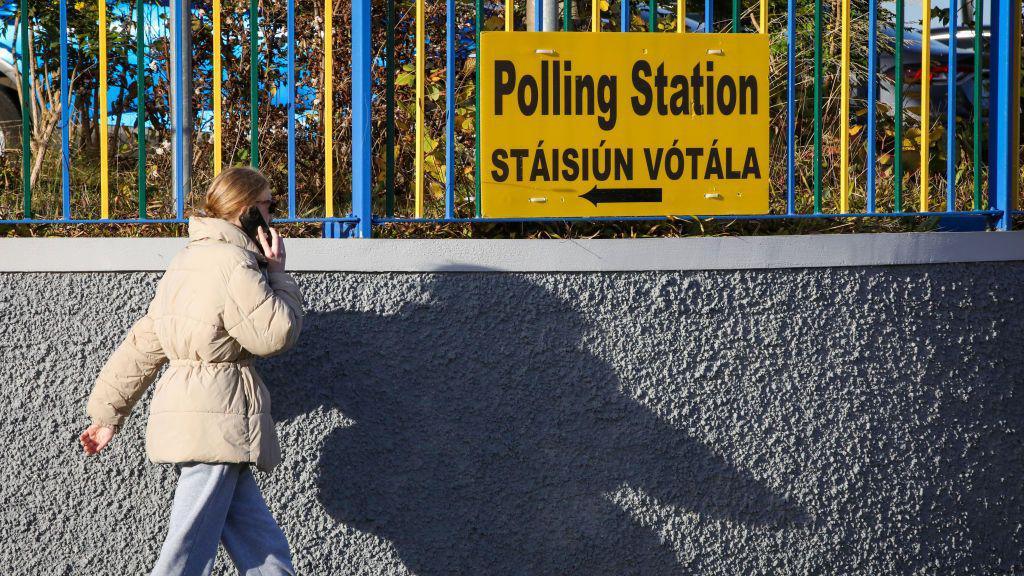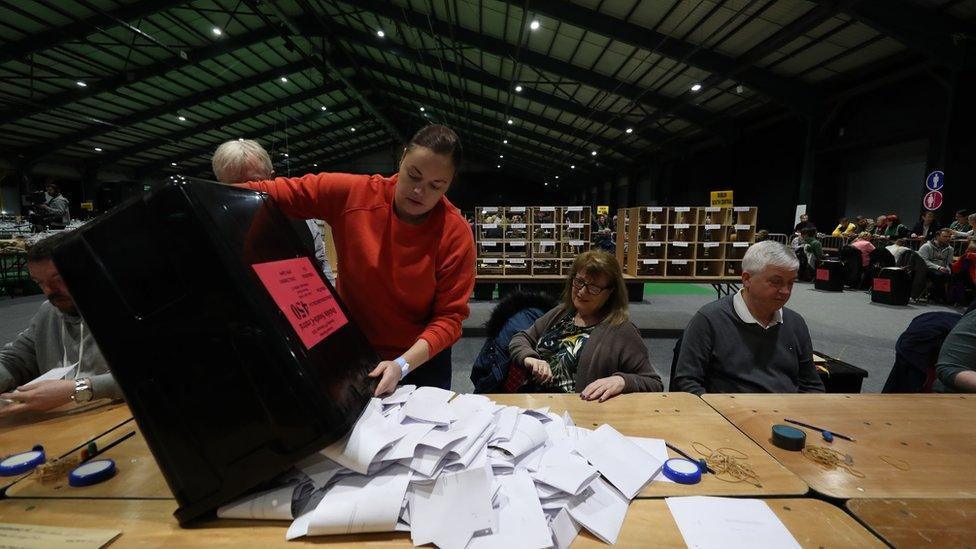Irish election 'too close to call', says taoiseach

Taoiseach and Fine Gael leader Simon Harris speaks to the media as he arrives at the election count centre in Wicklow
- Published
Taoiseach (Irish prime minister) and Fine Gael leader Simon Harris has said it is "too close to call" how many seats his party will win in the Irish general election.
Exit polls suggest a close contest between the three major parties.
Figures show Sinn Féin slightly ahead of both Fine Gael and Fianna Fáil in first preference votes.
Harris, Fianna Fáil leader Micheál Martin and Sinn Féin leader Mary Lou McDonald have been elected in Wicklow, Cork South Central and Dublin Central, respectively.
A record number of 174 Teachtaí Dála (TDs) are set to be elected, up from 160 in 2020 following a constituency shake-up.
There are now 43 Dáil constituencies (up from 39 in 2020) which will elect between three and five TDs each.
One seat in the Dáil goes to the Ceann Comhairle (Speaker), so 88 TDs is the number required for an overall majority.
The counting of votes at more than 40 centres across the Republic began at 09:00 local time.

Martin said the election will be "extraordinarily competitive".
"The good news for us in Fianna Fáil is - notwithstanding that competition from multiple parties and independents - we are competitive in every single constituency," he added.
Early tallies predicted that some government ministers may struggle to retain their seats.
Sinn Féin has polled well so far but less clear is how it will use that support to enter government.
Judging by the early tallies Fianna Fáil and Fine Gael are best placed to return to the government benches and may between them end up with between 75 and 80 just short of the 88 needed to secure a majority.
Fine Gael leader Harris said it will be a "tight" election.
“As I’ve been saying for many weeks, in any Irish election it’s quite straightforward to pick where the first or second or maybe even where the third seat might go in a constituency but trying to call the last or the second last seat is something that even Mystic Meg can struggle with,” he said.
Both Fine Gael and Fianna Fáil have ruled out sharing power with Sinn Féin.
That leaves McDonald contemplating other options including the possibility of a minority government with other left leaning parties and some independent TDs.
McDonald told BBC News that there "isn’t a straightforward pathway" to forming a government for any party, adding that it looks like a "close race" and insisted her party had received a "game changing and historic mandate".
She said she will do everything she can to explore "all the possibilities" for forming a government and that there "isn't a straightforward path" for any party.
Asked about plans for a referendum on Irish unity, she said: "We're at a stage where we need to talk about preparation for a referendum on constitutional change" and that there is an "immediacy and urgency for that conversation to happen".
She also said "no Irish or British government can bury their head in the sand" over the issue.
She also said she's had many conversations with Sir Keir Starmer and that the Prime Minister is "well aware of my thinking".
Anti-establishment campaigning

Sinn Féin president Mary Lou McDonald and deputy Michelle O'Neill arrive at the count at the RDS in Dublin
McDonald was elected in the third count in the Dublin Central constituency.
There is speculation that some Sinn Féin votes have gone to independent candidate Gerry Hutch.
The result raises questions into why Hutch's anti-establishment campaigning played better with voters than Sinn Fein's.
Hutch was cleared of murdering a man during a boxing weigh-in at a Dublin hotel in 2016.
Earlier this month, he was released on bail from custody in Spain.
Hutch was one of nine people arrested in Spain as part of a joint international investigation between the Garda National Bureau of Criminal Investigation and the Guardia Civil into money laundering by the Hutch Organised Crime Group.
Tight three-way race in Irish general election, RTÉ exit poll suggests
- Published29 November 2024
How the votes will be counted
The Republic of Ireland elects its government using a system of proportional representation known as the single transferable vote.
Voters rank candidates in their constituency in order of preference and candidates have to reach a certain number of votes in order to be elected.
Counting the ballots takes place in multiple rounds.
Each ballot is initially credited to the first choice.

Once a candidate receives the number of votes required, they are elected and any remaining ballots that are marked with them as first choice are transferred to the second ranked preferences.
Ballots continue to be transferred to the next usable preference until all of the seats in the constituency are filled with candidates who have reached the quota.
Once all the seats are filled, the next phase of the process will begin, the task of forming a new government.
When will the results be known?
Due to the voting system, counting can sometimes last multiple days, and forming a government can take even longer.
It took four months after the last general election in 2020 before Fianna Fáil, Fine Gael, and the Green Party reached a deal to form a government.
Sinn Féin became the leading opposition party, and Fianna Fáil and Fine Gael have both already ruled them out as a potential coalition partner.
The first meeting of the new Dáil (lower house of parliament) is on 18 December but it is unlikely coalition negotiations will have finished by then.
A government will be officially formed when the Dáil passes a vote to install a new Taoiseach (Irish prime minister), but this isn't expected to take place before 2025.
Related topics
- Published29 November 2024

- Published29 November 2024

- Published29 November 2024
